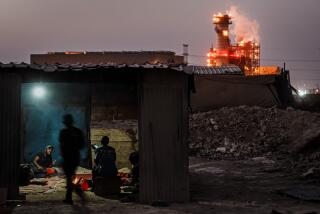A Champion for the Kurds
- Share via
For two years, largely unobserved by outsiders, the government of Iraq has been uprooting and forcibly resettling much of its Kurdish minority. So far, American officials say, as many as 500,000 Kurds--more than one-fifth of the Kurdish population--have been moved from their ancient towns and villages along the country’s northeastern border with Iran. President Saddam Hussein’s regime has tried to give the relocations a humane cast by claiming that their purpose is to relieve “residents of the border areas of the suffering to which they were subjected during the eight-year war with Iraq.” Their real aim is to punish the independence-minded Kurds for siding with Iran against a regime that uses the most brutal forms of repression as everyday tools of governance.
This is by no means the first punitive action taken against the Kurds by Hussein’s regime. Last year, fresh from battle-testing its chemical weapons against Iran, the government turned those same toxins against its own citizens, murdering as many as 4,000 Kurds in the town of Halabja alone. The more recent acts of reprisal have seen an estimated 700 towns and villages depopulated, their homes bulldozed into rubble. What seems to be under way is an effort once and for all to crush the nationalistic tendencies of that 20% of Iraq’s 16 million people who are non-Arab Kurds. By separating the Kurds from their traditional ethnic homeland, the Iraqi regime is also separating them from contact with other Kurds immediately across the border in Turkey and Iran. That, it hopes, will make them more compliant.
The United States and other Western countries have protested the relocations, but to no avail. Sen. Claiborne Pell (D-R.I.) proposes to go beyond diplomatic complaints by imposing economic sanctions on Iraq if its actions are determined to constitute gross violations of human rights. Sanctions could include ending all but the most necessary humanitarian aid, banning trade in goods subject to export controls and working to block loans and grants from international financial institutions. Would even these steps be effective in ending the abuses inflicted on Iraq’s Kurds? Quite possibly not, given the Baghdad regime’s repeatedly demonstrated contempt for public opinion and its assessment--unhappily all too correct--that the world’s memory for human rights violations tends to be short. But tangible protest measures ought nonetheless to be pursued. The Kurds are a people with a very long and often tragic history but with few friends and champions. That’s all the more reason why the United States and other civilized countries should move vigorously to try to lessen their sufferings.
More to Read
Sign up for Essential California
The most important California stories and recommendations in your inbox every morning.
You may occasionally receive promotional content from the Los Angeles Times.













